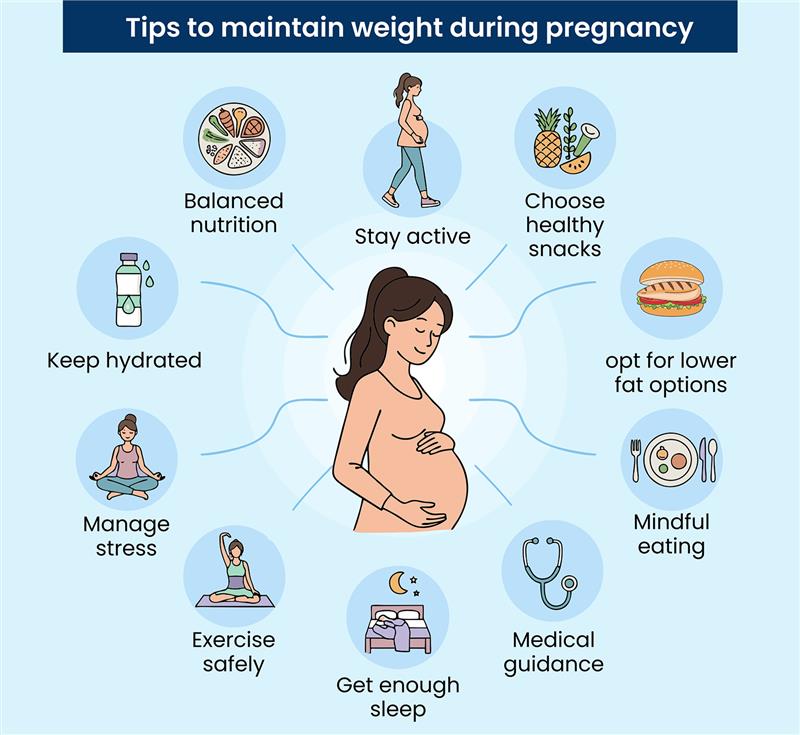Expectant mothers require 300 extra calories each day while ensuring they get nutrient-dense foods and without undue weight gain for the mother. For most women of average weight, it is recommended to gain between 25–35 pounds, for overweight women, 15–25 pounds, and for underweight women, 28–40 pounds.
For the first trimester, a total weight gain of 2–4 pounds is recommended; in the second and third trimesters, most women should gain about 1 pound per week. For twin pregnancies, 35–45 pounds are encouraged, with each twin weighing about ½ pound per week, the expectant mother will require approximately 3,000–3,500 calories a day in order to promote healthy birth weights.
What is the Ideal Body Weight During Pregnancy?
The American College of Obstetricians and Gynecologists (ACOG) recommends a pregnancy weight gain plan, assuming the expectant mother gained between 1.1 and 4.4 pounds (lb) during the first trimester.
| Weight | BMI | Average weekly weight gain in second and third trimesters | Overall |
|---|---|---|---|
| Underweight | under 18.5 | 1–1.3 lb | 28–40 lb |
| Normal weight | 18.5–24.9 | 0.8–1 lb | 25–35 lb |
| Overweight | 25–29.9 | 0.6 lb | 15–25 lb |
| Obese | over 30 | 0.5 lb | 11–20 lb |
Is Losing Weight During Pregnancy Safe?
Even though it's usually not advised to reduce weight while pregnant, you can find that you shed a little weight inadvertently in the first trimester. Food aversions, nausea, and other first-trimester pregnancy symptoms can all contribute to this.
A woman's doctor might advise her to lose weight if she is highly overweight when she becomes pregnant. Weight loss should only be done under a doctor's supervision. However, pregnant women shouldn't usually try to diet or lose weight.
Why is it Important to Maintain the Right Amount of Weight During Pregnancy?
Pregnancy-related weight gain below prescribed levels increases the risk of having an underweight child. Some babies born too small may have delayed development (not reaching age-appropriate milestones), have trouble initiating nursing, and be more susceptible to sickness.
Putting on more weight than is advised during pregnancy increases the risk of producing an overweight baby, which increases the risk of problems during delivery, cesarean delivery, and childhood obesity. Overweight gain can also raise the amount of weight you retain after giving birth, which increases the risk of obesity.

Pregnancy Weight with Twin Babies
If you're expecting twins or multiples, you're probably going to acquire more weight than someone expecting a single child. In other words, your body is producing twice as many people as it needs to, and your weight gain will probably show it.
If you were at a normal weight before getting pregnant and are expecting twins, the CDC suggests gaining 37 to 54 pounds. Underweight people are expected to gain more than that, and overweight people are expected to gain slightly less.
Where Do the Extra Pounds Go?
The baby and the protective structures the body builds for the infant account for a large portion of the additional weight accumulated during pregnancy. Usually, the placenta and baby weigh between nine and ten pounds more than the weight gained during pregnancy.
Amniotic fluid and increased blood volume may explain the six-pound increase. The growth of the uterus and breast tissue can also add four or more pounds. This means a healthy pregnancy weight gain results in very little weight retained as fat.
How to Maintain the Right Weight During Pregnancy?
Try these suggestions if your doctor advises you to put on weight while you're pregnant:
- Consume five to six modest meals each day.
- Stock up on simple, quick snacks like ice cream, yogurt, dried fruit, cheese, crackers, nuts, and raisins.
- Spread peanut butter on celery, apples, bananas, crackers, and bread. One tablespoon of creamy peanut butter contains nine grams of protein and around 100 calories.
- Add nonfat powdered milk to scrambled eggs, heated porridge, and mashed potatoes.
- You can add extras to your dish, such as cheese, sour cream, cream cheese, gravy, and butter or margarine.
How to Manage the Extra Pounds Effectively?
If your weight gain has exceeded your doctor's recommendations, discussing it with them is essential. Typically, it's best to prioritize weight loss after giving birth. To help regulate your weight gain, here are some helpful tips:
- When dining out, opt for lower-fat options, such as a grilled chicken sandwich with tomato and lettuce (without any sauces or mayo), a side salad with a low-fat dressing, plain bagels, or a baked potato without any additional toppings. Avoid high-calorie choices like French fries, mozzarella sticks, or breaded chicken patties.
- Steer clear of whole milk products. You should have four servings or more of milk products every day. On the other hand, drinking skim, 1%, or 2% milk will significantly lower your calorie and fat intake. Select yogurt or cheese that is fat-free or low-fat as well.
- Limit sugary or sweetened beverages. Sweetened beverages, such as fruit punch, fruit drinks, iced tea, lemonade, and powdered drink mixes, contain many empty calories. Opt for mineral water, club soda, or water to avoid consuming extra calories.
- When cooking, avoid seasoning food with salt. Water retention is brought on by salt.
- Cut back on sugary and high-calorie snacks. Foods high in calories but low in nourishment include cookies, sweets, doughnuts, cakes, syrup, honey, and potato chips. Avoid these meals daily for a lower-calorie snack and dessert. Consider fresh fruit, low-fat yogurt, angel food cake with strawberries, or pretzels.
- Incorporate fats into your diet in moderation. These can be found in common cooking oils: margarine, butter, gravy, sauces, mayonnaise, salad dressings, lard, sour cream, and cream cheese. Consider trying lower-fat options for a healthier alternative.
- Choose healthier cooking methods to prepare your food. Avoid frying in excessive oil or butter, which can add unnecessary calories and fat. Opt for baking, broiling, grilling, or boiling instead.
- Remember to include exercise in your routine. Moderate physical activity can help burn extra calories. Pregnant women can safely engage in exercises such as walking and swimming, but it's always an excellent idea to consult your healthcare provider before beginning any new exercise regimen.
What To Do If You’re Not Gaining Enough Pregnancy Weight?
According to the CDC, not gaining enough weight during pregnancy can be concerning since it increases the possibility of having an underweight kid. Hyperemesis and eating disorders are the two main reasons women don't gain enough weight during pregnancy.
A disorder known as hyperemesis gravidarum occurs when a pregnant woman has extreme nausea or vomiting. This makes eating enough to sustain your body and your kid's growth extremely challenging. The mother and unborn child aren't obtaining enough nutrients to grow when there is an eating disorder.













